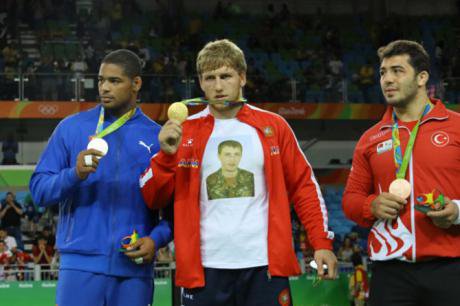
16 August: Artur Aleksanyan presents his gold medal to the cameras. In Armenia, the human cost of Karabakh is often linked to a cry for social justice. Source: Dalma News.Several months ago, Artur Aleksanyan stood atop the medal podium in Rio de Janeiro an Olympic champion. The Greco-Roman wrestler had just claimed Armenia’s second official gold medal at the 2016 Summer Games.
Aleksanyan’s celebration at the medal ceremony was particularly poignant. Instead of basking in the moment, the athlete used his opportunity to pay tribute to a 19-year-old fallen soldier. The soldier, Robert Abajyan, was an Armenian junior sergeant in the Nagorno-Karabakh Republic (NKR) Defense Army who was shot dead during the “Four day war” with Azerbaijan in April earlier this year.
The emotional tribute was a touching reminder of the troubles facing Armenia, and called attention to the difficult lives led by many athletes from the post-Soviet space. For many, a career in sports is one of few avenues of social mobility. While Aleksanyan and others often train in unimaginable poverty, their nation’s sports representatives indulge in luxurious lifestyles and wallow in their ill-gotten wealth.
Following the collapse of the Soviet Union, many athletes fled their respective failed states and ventured abroad to salvage their professional careers. Those who remained faced a dramatically altered climate — athletes who were once the pride and joy of the Eurasian power were reduced to poverty and criminal activity.
Eventually, the collapse of the Soviet Union resulted in the fragmentation of various states, some of which retained Soviet nostalgia and tactics, while others were merely swallowed by the pitfalls of rapidly implemented capitalism and newfound freedom. In short, the result was corruption and authoritarianism, as well as a renewed political interest in sports as a source of national prestige.
Wrestling for Armenian dignity
On a hot summer day in Gyumri, Armenia, you could almost see the sweat evaporating off the backs of the wrestlers rolling around in the Greco-Roman school. Paint peels peppered the ground around the blue and yellow mats, leaving rubbery sheets of filth on the walls. A pair of shoes lay in the corner of the room, surrounded by loose wooden boards and broken benches. The dark coloured sneakers stood out against the debris-filled backdrop as the cleanest item in the room.
Asbestos bubbled through cracks in the walls, shortening the lives of athletes in search of a way out of their moldy encampment. And yet, one amongst them was about to strike gold in Rio.
According to Levon Barseghyan, president of the Asparez Journalists Club and editor-in-chief of asparez.am, Aleksanyan achieved that incredible feat in spite of his impoverished upbringing and limited resources. This is evident in the short video clip that Barseghyan posted from the Olympic champion’s training facility, deteriorated and degraded.
When he first won the European wrestling championship four years ago, “it was the moment when different Armenian officials made a promise to renovate his alma mater, the wrestling school in Gyumri,” Grigor Atanesian, deputy editor-in-chief of Esquire Russia, tells me. “No such changes ever occurred.”
“It is a terrifying example of an unimaginable lack of sanitation and bad conditions. Nowadays, Artur reigns the Greco-Roman wrestling 216 lb division as Olympic gold champion, and the school is named after him, but nothing really changed.”
The skewed distribution of wealth in Armenia and the government’s willingness to masquerade their athletes’ poverty with sporting achievements is the root of the problem. Take the president of Armenia’s Olympic Committee - Gagik Tsarukyan, a name synonymous with Armenian sports for well over a decade.
Resources are not afforded to athletes and are instead liquidated and pocketed by politicians
Tsarukyan, who owns several large businesses and a tasteless hilltop mansion on the outskirts of Yerevan, is regarded as one of the most powerful of the government-connected oligarchs in Armenia. The Armenian businessman and politician controls Armenian sports, using his various positions of power within the Olympic Committee and elsewhere to increase his wealth.
Yet Tsarukyan’s increased influence over the country and its athletes has been detrimental to their overall development. Resources are not afforded to athletes and are instead liquidated and pocketed by politicians. Those who want to achieve at the Olympic Games do so on their own expense.
“Tsarukyan has been in charge of everything in Armenian sports since 2004, though it never was the only job for the notorious oligarch, who is believed to be among Armenia’s richest businessmen,” Atanesian adds. “In a country suffering from very high rates of poverty, his name is a synonymous with bad governance and ubiquitous corruption.”
In an attempt to alleviate negative publicity after pictures of the shacks that Armenia’s Olympians grew up in went viral, Tsarukyan bought Olympic silver medalist Gor Minasyan a four-room home as a supposed gift. Minasyan declared that this “was neither a gift nor philanthropy. This is an award for the results that I have shown, which, I believe, I have earned.”
Russia’s fragile olympic might
In the immediate aftermath of the Rio Olympics, one Russian competitor was celebrated above all others — Abdulrashid Sadulaev, the freestyle wrestler of Avar descent. Nicknamed the “Russian Tank”, Sadulaev claimed Olympic gold in the 86kg division, the 14th gold medal of his professional career.
Upon his return to Russia, Sadulaev was one of the featured guests at the Olympic reception. President Vladimir Putin awarded the athletes with the Order of Friendship and appeared to exchange kind words with the 20-year-old. All Russian medalists received a cash prize of over one million rubles and a new BMW luxury vehicle from the government on that day.
The ceremony was taped for Russian television. The entire country was to know that the Russian government supported its athletes and awarded them for their international efforts.
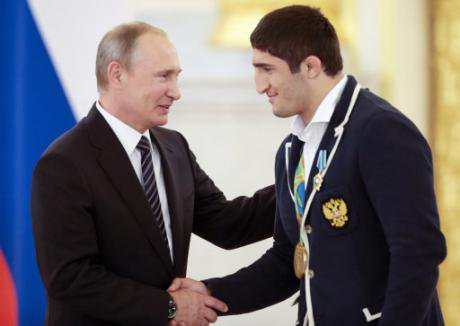
Russian President Vladimir Putin shakes hands with Russia's Abdulrashid Sadulaev. (c) Ivan Sekretarev / AP / Press Association Images. All rights reserved.Sadulaev was later greeted as a national hero in his native Dagestan, where the republic’s head, Ramazan Abdulatipov, awarded him with a valuable Akhal-Teke horse, another cash prize and a new house for his family. The gift-giving culture was on full display that week, as the shy Sadulaev paraded his horse around his village and constantly thanked the politicians who supported him during his Olympic run.
Though likely unaware at the time, Sadulaev had already been indoctrinated into Russia’s system of power. He was well on his way to becoming a member of the political elite through social mobility only available to a select few. Like many other talents before him, Sadulaev is likely to become a politician who will one day work alongside many of the people who showered him with gifts.
Already considered a role model at the age of 20, Sadulaev is a perfect example of how Russian athletes are shaped by local politicians their own political gain. They provide them with the social mobility that most athletes long for and then place them in a position of authority to gain the support of the next generation’s youth — a strategy perfected on freestyle wrestling great (and now State Duma member) Buvaisar Saitiev.
Athletes can be used for a variety of political manoeuvers, including motivational speeches, inspiration and propaganda
“Not only they are extremely popular and associated with country’s international prestige, but, as a rule, all retired of sports to the age of 35-40 years with very few career options besides politics and coaching,” Atanesian explains. “This is no surprise, thus, to see among the State Duma’s MPs three-time Olympic Greco-Roman wrestling champion Aleksandr Karelin, two-time WBA heavyweight champion Nikolai Valuev, three-time Olympic hockey champion with the USSR team Vladislav Tretiak.”
Athletes can be used for a variety of political manoeuvers, including motivational speeches, inspiration and propaganda. Two-time gold medalist pole vaulter Yelena Isinbayeva, who was banned from competing at Rio 2016, visited Russian troops at an air base in Syria shortly after the prestigious tournament. She trained alongside the soldiers and provided a morale boost.
“I mean of course Yelena Isinbayeva and other Olympians are Kremlin’s little helpers, but at the same time they are real heroes of this generation—more of interest, maybe, than any pop stars,” Atanesian tells me.
Gangster ways
While successful Russian athletes quickly become accustomed to life as a political pawn following retirement, others are quashed and repressed because of the political hierarchy and those in power who abuse it.
During the Rio Games earlier several months ago, intimidation and harassment took centre stage in the wrestling community when the president of the Russian Wrestling Federation Mikhail Mamiashvili attacked Inna Trazhukova following her bronze medal match loss in the women's 63kg division. Reportedly intoxicated, Mamiashvili lunged at the unsuspecting 25-year-old backstage and hit her twice in the face while shouting obscenities in front of stunned witnesses.
Trazhukova, who refused to remain silent following the assault, revealed the incident to Russian sports outlets. Mamiashvili immediately denied the accusation and showed no remorse for his actions, informing the media that no court decision would change the way he handles his athletes and that Trazhukova was to blame because she did not act honorably in her final match and simply gave away the medal. This is typical behaviour from a man who rules over Russian wrestling with an iron fist, largely due to his reputation as an allegedly longstanding member of the Georgian mob in Moscow.
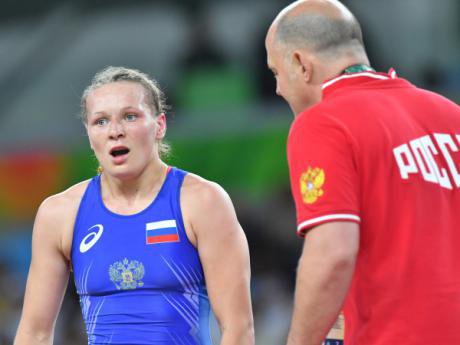
Inna Trazhukova fights for third place in the women's 63-kilogramme division in freestyle wrestling. (c) Alexey Kudenko / RIA Novosti. All rights reserved.Mamiashvili, whose international career includes an Olympic gold in freestyle wrestling, has long been associated with organised crime. While he has never been convicted for his alleged past, his history is an open secret. While still an athlete, Mamiashvili met Otari Kvantrishvili, the most influential Georgian gangster in Russia during the 1980s and 1990s. Mamiashvili was considered to be one of Kvantrishvili’s “kids”, a term used for a close and highly ranked confidant. However, when Kvantrishvili was assassinated in 1994, Mamiashvili stepped away from the limelight, rebranding himself as a sports administrator.
By the early 2000s, he was president of the Russian Wrestling Federation, a FILA Bureau Member, and the vice president of United World Wrestling, the governing body for Olympic wrestling — all of this gave Mamiashvili tremendous power over local athletes and international events.
Proud athletes are often reduced to a humiliating public relations tactic designed to alter the perception of reality
“There is always this idea in the rhetoric of Russian political elite that Putin-established order marked the end of the gloomy 1990s, with its racketeering mobs and instability,” Atanesian tells me. “But Mamiashvili is clearly a man who thinks and acts like a person from 1990s and that’s not a mere coincidence — he was numerously accused of ties with organized crime, and at least twice denied a US visa on that matter.” The alleged gangster is such an intimidating force that Trazhukova withdrew her allegations upon her return to Russia. Few questioned her decision. As an individual athlete, she was powerless.
Trazhukova’s terrifying incident reveals how difficult it is to be a female Olympian in the Russian Federation, particularly given the extreme misogyny that still grips Russian society. It also sheds light on athlete intimidation and how officials often scare competitors into submission, with impunity for the perpetrator.
Perception versus reality
Though Aleksanyan, Sadulaev, and Trazhukova each represent vastly different athletic trajectories, they share a common denominator: athletes afflicted by their respective country’s obsession with public perception in sports. While little else entwines the talented competitors, they are all products of the post-Soviet sports sphere, which values athletes as public role models and national representatives.
For Aleksanyan, who claimed Armenia’s second-ever Olympic gold at the Summer Games, his success came despite a lack of resources and support from his corrupt government. He emerged from a dirt-ridden shack he referred to as home, a dusty gym layered with asbestos where he honed his craft, and claimed championship gold despite his disadvantages. Yet the necessitous Olympian will now be used by the regime to help blur the class divide in Armenia.
Poverty is used as a deterrent, a reminder of the lives that athletes sweat and sacrifice to leave behind
Proud athletes are reduced to a humiliating public relations tactic designed to alter the perception of reality while the rich continue to reap rewards on personal sacrifices. Tsarukyan, for example continues to reside in his enormous mansion, the Olympians he supposedly champions live on in their shacks.
Further north, the public perception of athletes is quite similar — the Russian government showers them with gifts in an attempt to accentuate their own generosity and support for successful international representatives. Ceremonies are held in their honour, while the president himself hands out medals, BMWs and cash prizes to the victorious.
Athletes like Sadulaev accept these gestures before being indoctrinated as political tools for the realisation of particular ambitions. They could be used as versatile tools used to exercise control over a population or as propaganda puppets when necessary. It is the expected trajectory for athletes in Russia, especially those craving social mobility and elite status in their communities.
In the end, poverty is used as a deterrent, a reminder of the lives that athletes sweat and sacrifice to leave behind.
In the North Caucasus, sports rule the roost. Find out more here.
Read more
Get our weekly email
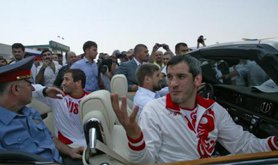
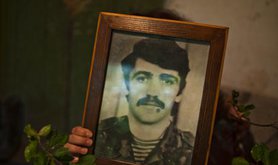
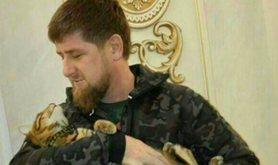
Comments
We encourage anyone to comment, please consult the oD commenting guidelines if you have any questions.